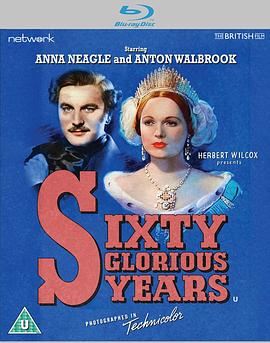Sixty Glorious Years is an exercise in the creation of iconography, both for Victoria and its star, Anna Neagle (who subsequently became known as 'Regal Neagle'). Just as Elizabeth I commissioned artists to create flattering iconic images for public consumption, so this film performs a similar function, for Neagle is more beautiful than the real life Victoria. Controversial events (such as the 'Irish problem') are omitted and unpleasant aspects of Victoria's character (her petulance, arrogance, favouritism and 'right to privilege') are glossed over as endearing little 'whims'. Albert acts as a moderating influence when she goes too far. The film followed a year after the highly successful Victoria the Great (d. Herbert Wilcox, 1937). Again the screenplay is by Miles Malleson and Robert Vansittart, and many of the supporting cast (the cream of acting talent of period) repeat their roles, this time for the colour cameras. This was the first full length Technicolor film of cinematographer Freddie Young, who captures the spectacle of royal weddings, grand balls and opulent interiors, with scenes actually filmed at royal palaces. Vivid battle scenes, set in Alexander Korda's empire territory (Sevastopol and the Sudan), rival those in The Four Feathers (d. Zoltan Korda 1939). The title music sets the tone a regal choir sings over a shot of the crown. Elgar's 1901 'Pomp and Circumstance' march is heard during the diamond jubilee celebrations and, as Victoria's coffin lies in state, the film concludes with Anthony Collins' stately music accompanied by the text of Rudyard Kipling's 'Lest we forget'. Combined with the emotional appeal of scenes of Victoria connecting with her 'ordinary folk', this is stirring stuff. The film connects with contemporary events of 1938. The release of two celebratory royal films was intended to boost public affection for the monarchy in the wake of Edward VIII's abdication. Anglo-German relations were another touchy subject. With another war on the horizon, influential voices wanted appeasement, and the film could be seen to fit that agenda. Victoria herself was of mainly German descent, nicknamed 'the grandmother of Europe', while Albert is a 'good German', charmingly played by Anton Walbrook as a cultured, decent man. Sixty Glorious Years now seems unduly formal and reverential. Had movies existed during Victoria's reign (they only emerged at the end) this might have been the kind of film produced. Unlike Mrs Brown (d. John Madden, 1997), it is all so very 'Victorian'. Roger Philip Mellor
猜你喜欢
- 987播放更新第10集剧场剧情片
- 197播放正片着魔剧情片
- 454播放更新HDX谁嫁谁噶了谁剧情片
- 820播放HD中字大象之歌剧情片
- 898播放HD中字角斗士2剧情片
- 399播放HD中字天堂岛疑云:2024圣诞特别篇剧情片
- 697播放正片孔秀剧情片
- 159播放更新TC好东西剧情片
- 644播放HD熔炉2011剧情片
- 745播放HD中字教父2剧情片
- 304播放HD中字音乐之声剧情片
- 872播放HD中字低俗小说剧情片
- 755播放HD中字七宗罪剧情片
- 211播放HD中字镜中人剧情片
- 788播放HD灵偶剧情片
- 936播放HD国语新大头儿子和小头爸爸3:俄罗斯奇遇记剧情片
- 396播放DVD审死官剧情片
- 129播放更新HD89分之一的凶手剧情片
- 601播放HD中字深海大鱼剧情片
- 731播放HD荒原剧情片
- 702播放HD国语英字石门剧情片
- 172播放HD世界上最爱我的人剧情片
- 435播放HD中字惊曝内幕剧情片
- 505播放HD中字童年往事剧情片
